正说反译
- 格式:doc
- 大小:31.50 KB
- 文档页数:5
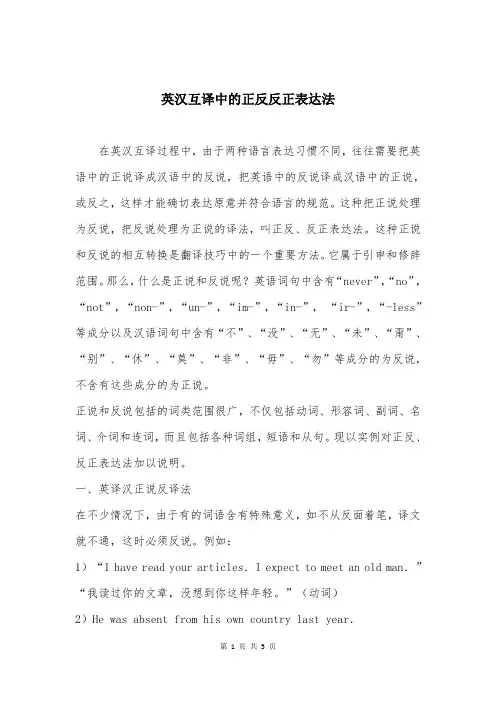
英汉互译中的正反反正表达法在英汉互译过程中,由于两种语言表达习惯不同,往往需要把英语中的正说译成汉语中的反说,把英语中的反说译成汉语中的正说,或反之,这样才能确切表达原意并符合语言的规范。
这种把正说处理为反说,把反说处理为正说的译法,叫正反、反正表达法。
这种正说和反说的相互转换是翻译技巧中的一个重要方法。
它属于引申和修辞范围。
那么,什么是正说和反说呢?英语词句中含有“never”,“no”,“not”,“non-”,“un-”,“im-”,“in-”,“ir-”,“-less”等成分以及汉语词句中含有“不”、“没”、“无”、“未”、“甭”、“别”、“休”、“莫”、“非”、“毋”、“勿”等成分的为反说,不含有这些成分的为正说。
正说和反说包括的词类范围很广,不仅包括动词、形容词、副词、名词、介词和连词,而且包括各种词组,短语和从句。
现以实例对正反、反正表达法加以说明。
一、英译汉正说反译法在不少情况下,由于有的词语含有特殊意义,如不从反面着笔,译文就不通,这时必须反说。
例如:1)“I have read your articles.I expect to meet an old man.”“我读过你的文章,没想到你这样年轻。
”(动词)2)He was absent from his own country last year.他去年不在自己的国家。
(形容词短语)3)He dived into the water fully clothed and rescued the children.他衣服没脱就跳入水中,把孩子救了上来。
(副词)4)He was extremely sorry for the shortness of time.他对时间不足感到十分抱歉。
(名词)5)I do think that it is beyond his power to fulfill the task.我的确认为要完成这项任务是他力所不及的。
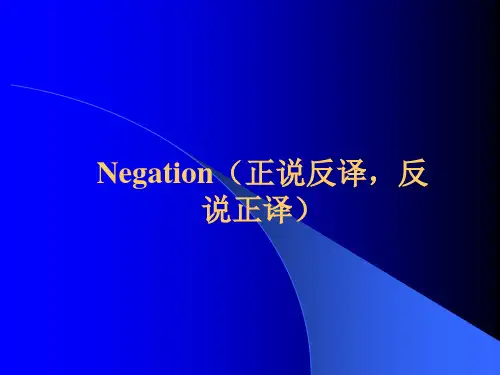
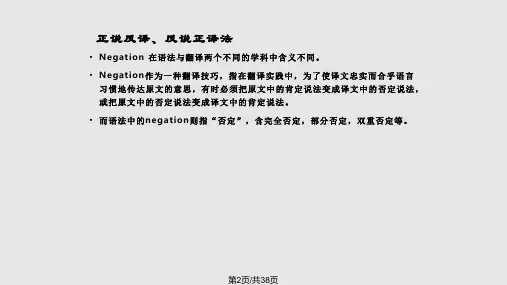
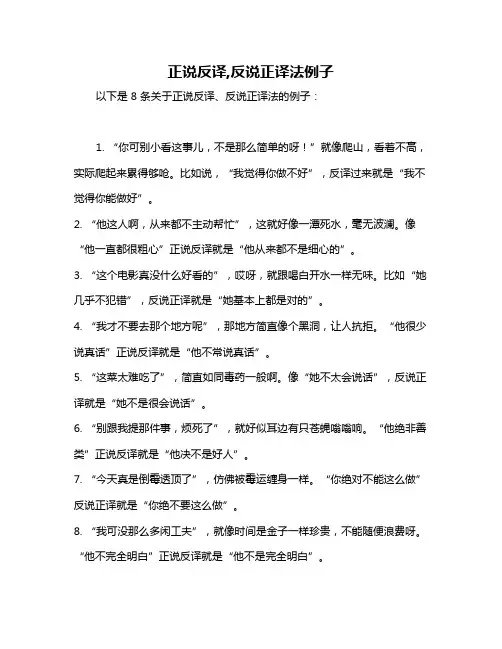
正说反译,反说正译法例子
以下是 8 条关于正说反译、反说正译法的例子:
1. “你可别小看这事儿,不是那么简单的呀!”就像爬山,看着不高,实际爬起来累得够呛。
比如说,“我觉得你做不好”,反译过来就是“我不觉得你能做好”。
2. “他这人啊,从来都不主动帮忙”,这就好像一潭死水,毫无波澜。
像“他一直都很粗心”正说反译就是“他从来都不是细心的”。
3. “这个电影真没什么好看的”,哎呀,就跟喝白开水一样无味。
比如“她几乎不犯错”,反说正译就是“她基本上都是对的”。
4. “我才不要去那个地方呢”,那地方简直像个黑洞,让人抗拒。
“他很少说真话”正说反译就是“他不常说真话”。
5. “这菜太难吃了”,简直如同毒药一般啊。
像“她不太会说话”,反说正译就是“她不是很会说话”。
6. “别跟我提那件事,烦死了”,就好似耳边有只苍蝇嗡嗡响。
“他绝非善类”正说反译就是“他决不是好人”。
7. “今天真是倒霉透顶了”,仿佛被霉运缠身一样。
“你绝对不能这么做”反说正译就是“你绝不要这么做”。
8. “我可没那么多闲工夫”,就像时间是金子一样珍贵,不能随便浪费呀。
“他不完全明白”正说反译就是“他不是完全明白”。
我觉得这种翻译方法很有趣,能让我们更灵活地理解和运用语言,有时候能更加准确地表达出我们的意思呢!。

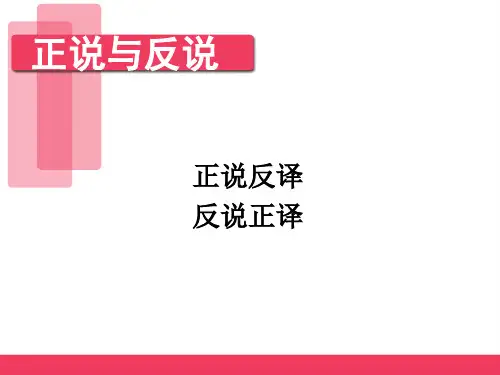
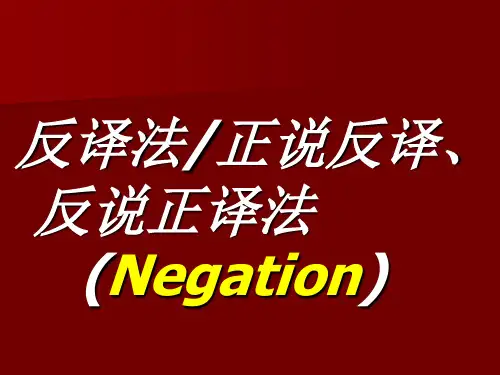
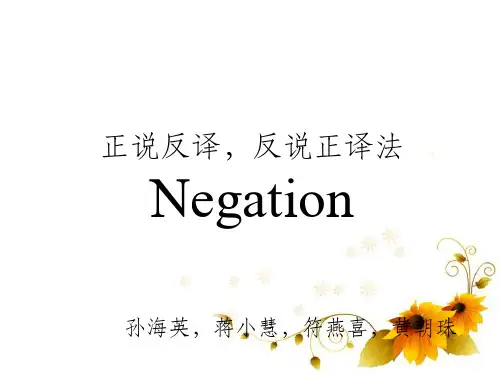
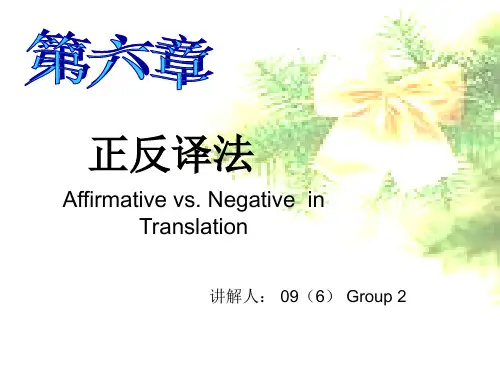
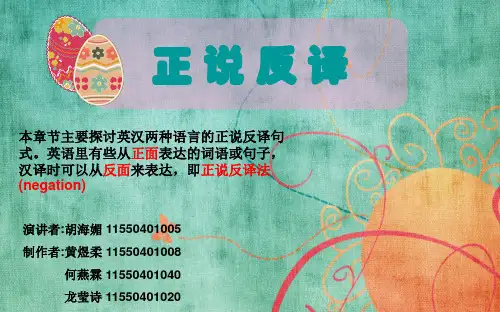
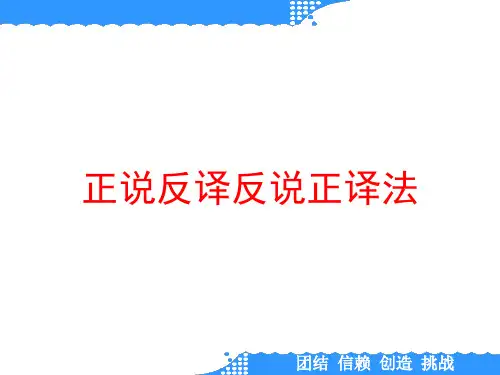
第八章英翻译技巧(五)正说反译反说正译正说反译、反说正译的应用不论是正说反译还是反说正译,究其原因归纳起来主要是:保证语义明确、加强修饰效果、尊重汉语习惯,保证译文通畅易懂。
所谓反面表达,是指英语词句中含有“not”,“never”,“no”,“un-”,“im-”,“ir-”,“in-”,“less-”等否定成分,汉语词句中含有“不”、“没”、“无”、“未”、“甭”、“别”、“休”、“莫”、“毋”、“勿”、“非”等否定成份,不含这些成份的为正面表达。
(一)正说反译的应用1.谓语动词或动词词组本身表示否定意义,常见的有:Fail, fizzle out, fall short, be frustrated, escape, elude, slip away, stop, cease, overlook, ignore, neglect, refuse, grudge(怨恨,不情愿做), disdain, reject, turn down, forbid, prohibit, exclude from, bar, ban, expire, be blind to, deny, avoid, omit, forget, prevent from, live up to, resist, miss, lack. I missed what you have said because of the noise outside.由于外面的噪音,我没听清楚你说的话。
To our disappointment, he failed to take the overall situation into account. 使我们失望的是他不顾大局。
Such a chance was denied to me.我没有得到这样一个机会。
2.介词或介词短语含否定之意,常见的词有:Above, against, below, beneath, beyond, instead of, out of, without, but for。
第七部分正说反译,反说正译英译汉1.It is wiser than to believe what you call money talks。
我不至于蠢到相信你说的金钱万能呢。
2.He could do anything he was asked to do but return to his old life.叫他干什么他都愿意,只要不让他再过从前的日子。
3.All graduates from Foreign Language Institutes will not be appointed to do translation work.外院的学生并非都被分配去做翻译工作。
4.Africa is not kicking out western imperialism in order to invite other new master.非洲踢出西方帝国主义,不是为了请进新的主人。
5.Both sides thought that the peace proposal was one they could accept with dignity.双方都认为开会不失体面地接受这样的和平方案。
6.One could not be too careful in a new neighborhood.新到一个陌生的邻里,越小心越好。
7.Nothing is so beautiful but it betrays some defect on close inspection.再漂亮的东西,只要仔细观察,也会发现某种缺陷。
8.The moon is a world that is completely and utterly dead, a sterile mountainous waste.月球上北京一个毫无生机的世界,是多山的不毛之地。
9.All the chemical energy of the fuel is not converted into heat.燃料中的所有化学能并不都转化为热能。
1、正说反译:Miss the bus没有赶上车Live up to the expectations of my parent不辜负父母的期望Be absent from the meeting没有出席会议A final decision不可更改的决定Frost-free refrigerator无霜冰箱Freeze别动Mortally ill不治之症The window refuses to open窗户打不开Children were excluded from getting in the building 儿童不许进入这个房间The explanation is pretty thin这个解释站不住脚I have fallen behind with my correspondence我有一些信件还没有回复Fully clothes, he fell across his bunk and was instantly sleep 衣服也不脱,他往床上横着一倒,不一会儿就睡着了Don’t lose time in posting this letter不要忘了寄这封信No deposit will be refunded unless ticket produced凭票退押金例1:原文:她忍住了没有笑出声。
译文:She refrained from laughing.例2:原文:花园根本无人整理。
译文:The garden was in a state of total neglect.例3:原文:我不能忍受你的脾气。
译文:Your temper is more than I can bear.例4:原文:他宁死不屈。
译文:He would die before yielding.例5:原文:生活远非净是乐事。
译文:Life is far from being a bed of roses.例6:原文:风景美得无以言表。
译文:The scenery is too beautiful for words.That’s a thing that might happen to anyone.这种事谁也免不了。
Opportunity knocks but once.机会只来一次。
2.反说正译Such flig hts couldn’t long escape notice.这样的飞行迟早要被发现的。
一.反说正译:我们将正译法的使用大致分为三类.(一)祈使句中的否定说法有时正译,因为说话人想表达的常常是一个正面的意义. No smoking!严禁吸烟No deposit will be refunded unless ticket produced.凭票退还押金.Don't lose time in posting this letter.赶快把这封信寄出去.(二)双重否定正译.We must never stop taking an optimistic view of life.我们对生活要永远抱乐观态度.The significance of these incidents wasn't lost on us.这件事引起了我们的重视.Such mistakes couldn't long escape notice.这类错误迟早会被发觉的.Elliott was too clever not see that many of the persons who accepted his invitation did so only to get a free meal and that of these some were stupid and some worthless.艾略特是一个聪明人.他定能看得出许多接受他邀请的人只是为了来吃一顿不花钱的饭.他知道这些人有的愚不可及,有的则微不足道.(三)有些否定表达在译成汉语时,为了符合目的语的语言习惯,则需使用正译法. The examination left no doubt that the patient died of cancer.检验结果清楚地表明病人死于癌症.Even so, I still insist that for the individual himself nothing is more important than this personal, interior sense of right and wrong.即便如此,我仍坚持认为,对个人而言,最重要的莫过于这种根植于个人心灵深处的是非感,以及坚决按这种是非感行事的决心.Hitler's undisguised effort to persecute the Jews met with world-wide condemnation.希特勒对犹太人的露骨迫害行为受到全世界的谴责.Mr. Rumsfeld said the Soviet Union was unprecedentedly engaged in a missle-building program.拉姆斯菲尔德说,苏联正以空前的规模推行制造导弹的计划.二.正说反译:(一)英语中很多词本身就含有否定意义,beyond, absent, stop, bad, avoid, exclude, except, doubt, resistant, refuse, few, little, 这类词在翻译中要译出它的含有的否定意义.The window refuses to open.窗户打不开.Children were excluded from getting in the building.孩子不许进入这幢楼房.Such a chance denied me.我没有得到这个机会.The explanation is pretty thin.这个解释站不住脚.I have fallen behind with my correspondence.我有一些信件没有及时答复.Fully clothed, he fell across his bunk and was instantly sleep.他衣服也不脱往床铺上横着一躺,很快就睡着了.He was 75, but he carried his years lightly.他75岁了,可是并不显老.(二)有些正反译法可以增强修辞效果,但使用的时候需要非常慎重.Sir William and Lady Lucas are determined to go, merely on that account, for in general you know they visit no new comers.卢卡斯爵士夫妇打定主意要去,还不就是为了这个缘故,因为你知道,他们通常是不去拜访新搬来的邻居的.翻译练习在翻译下列句子时请使用正反译法(注意斜体部分).The world today is far from peaceful.Africa is not kicking out Western imperialism in order to invite other new masters.Mr. White has refrained from making any official comment on the coup in that country.Don't make your conclusion before the end of the year.The train coming from Moscow will arrive in no time.Her husband hates to see her stony face.Do you know why she is always trying to avoid youLaw is no respecter of persons.His arrival three days in advance is beyond our expectation.The idea that he should become an assistant to his boss has never deserted him.三,汉译英正说反译法汉语中有些词语是肯定(正说)的,但译成英语却是否定(反说)的.例如:欧妮铺上一块洁净的白桌布,又去取来些葡萄.Eugenie unfolded a clean white table cloth and went to fetch some grapes. 在希腊人的生活中,奴隶制是得到默许的.Slavery was implicit in Greek life.(形容词)她非常勉强地来了.She came very unwillingly.(副词)这家机构因公正在国际上享有声誉.The agency enjoys an international reputation for impartiality.(名词) 她光着脚走进了房间.She came into the room with no shoes on.(介词短语) 尼克松是个彻底的现实主义者.Nixon was nothing if not a realist.(短语)。